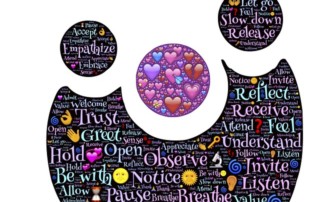How to Build Trust and Intimacy In Relationships – A TED Talk to Share
I heard this TED talk with Louise Evans a while back, and when it came to me a 2nd time, I had to share it with you!
This reminded me of an exercise from nonviolent communication (NVC for short), called, “The Four Ears.”
Marshall Rosenberg, the founder of NVC, says we have four options for receiving negative messages, and they are:
- We judge ourselves.
- We judge others.
- We empathize with ourselves.
- We empathize with others.
Our response largely depends on how we hear and interpret these messages.
In other words, our response will depend on what we’re making the situation mean – about ourselves, others, or the world.
So, depending on how we interpret something, we potentially create calm or chaos.
It’s our choice. But it’s often an unconscious one.
Louise says, “in every moment, we’re making choices about our behaviors that we’re bringing into the world.” And, she shares a step we can take before reacting that supports us in making those choices consciously.
In this TED Talk of “The 5 Chairs”, Louise calls this step, WAIT. It’s the transition step between judgment and empathy where she invites us to ask ourselves, “What Am I Thinking?”, before we react.
How many times has something happened and we immediately go to judgment, and we react, based on our own perception of what we just heard or saw?
And, how many times is our perception off, and we jump to a conclusion that isn’t even true?
This is the power of the Pause.
I love how she reminds herself to hang on for a second, noting that she needs more data because she doesn’t have all the puzzle pieces yet. She consciously decides to check the meaning making in her head against what’s really in front of her.
When we pause here, we allow ourselves to consider, just for that brief moment, what else might be going on, besides the story we’re telling ourselves.
- Pausing gives us space to mindfully choose our next step.
- Pausing gives us time to carefully respond, instead of instantly react.
- Pausing gives us clarity because we’re checking in with our own internal dialogue.
If you find that you’re reacting more than you’d like in your relationships, whether it’s at home, at work, in your family dynamics, with your partner or children, you’re not alone.
See if you can integrate WAIT before reacting.
Ask yourself what you are thinking.
Ask yourself what you’re making this situation mean, and if it’s even true.
See if you need more information before you respond.
And then, watch your relationships begin to shift.
Because they will shift!
When you Pause to ask yourself what you are thinking, what you are making this mean, and what story you’re telling yourself, you then have the opportunity to check it out with the other person to see if any of that was even true.
If you’re feeling confused and needing clarity around your best next move, here’s a few bonus questions to support you in seeing if your actions are aligned with your values:
- What’s important here?
- What matters most to me?
- What do I want?
- What do I need?
Connecting to our needs and values FIRST allows us to make conscious choices that will bring us closer to our desires.
Drop me a line. I’d love to know how this impacts you!
Wishing you love and connection,
Chris
P.S. I also loved the cost of “being right” (8m22 into video). See if you can relate. I know I could see a previous version of myself where my detail oriented perfectionist ran the show. 😉


